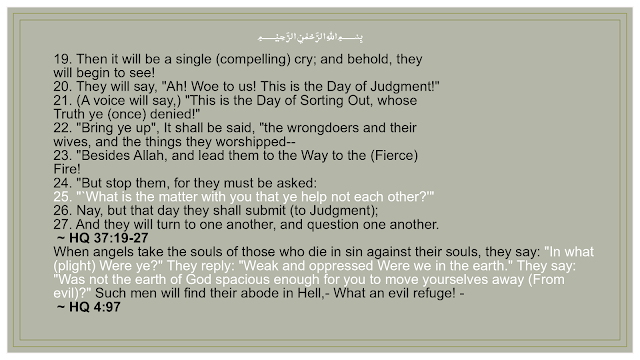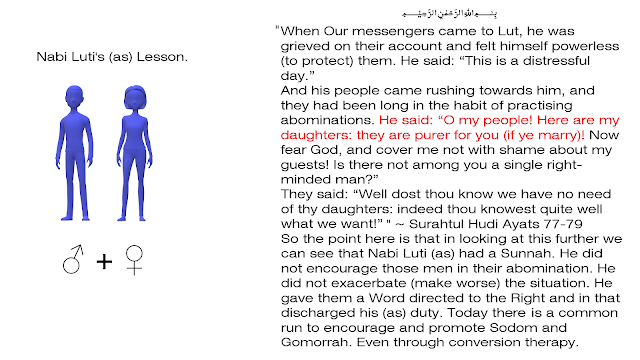Bismi Allahi Al Rahmani Al Raheemi
ASA WR WB to believing Muslim friends
We suggest to the rich to give to the poor (which mind you they are not compelled to do, and this must remain clear). We do not suggest to the poor to remain poor. We talk to the poor about faith, hope and gratitude to Allah for what is, now and current, and although thin is not worse. We talk about that all blessings, provisions, beautitudes, etc. are in Allah's Hands to distribute or not distribute. We talk about righteousness and productivity, Nabi Salih (epbuh). Please click any of these graphics to enlarge if not legible.
We talk about study, education, discipline, and expertise, Nabi Idris (epbuh).
We talk about weighing with just scales after fair markups of our products, and the giving to the people the things that are due to them, Nabi Shuaybi (epbuh).
We talk about living within the Golden Mean or Optimus or Optimal Quality of life and the saving or storing of the excesses in Maximus periods of earnings or sales for use of that excess that was saved in Minimus periods to maintain Optimus throughout both periods, and that trade and charity from those stores or savings were still conducted, Nabi Yusuf (epbuh).
We talk about fulfilling obligations and engagements, Nabi Ibrahim (epbuh).
We talk about Allah (swt) marshalling people forward and telling His (swt) Angels (as) to ask the people being marshalled forth, "In what plight were ye on Earth" They answer, "Weak and oppressed." The Angels (as) answer, "Was not My Earth spacious enough for you to move yourselves away from evil? Cast them into Hellfire." For they had been categorized as Zalimun, that due to poverty they succumbed to Zalim. He (swt) will also ask His (swt) Angels (as) to ask, "What is the matter with you? Why didn't ye help one another?"
We also tell them about Sheba (as) or the Chapter of Sheba, when people asked Allah (swt) to make the journey stages longer that He said in the Ayah prior to this ask what He had done, "We properly measured the distances of the journey stages." But the making of the journey stages longer caused Zalim to grow and they succumbed to become Zalimun. So while Allah (swt) is with the patient ones or Musabirun, Baqarah 153, He (swt) does not prefer making the journey stages of life longer than they naturally should be because it will cultivate Zalim or injustice and that will cultivate desperation.
We know by the late Hafizul Quran Abdullah Yusuf Ali (may peace and blessings of Allah be upon him) that a defining quality in the meaning of the name of the evil one is desperation. Thus, we do not wish to be cultivators of desperation. Because desperation can be a breeding ground for evil, wickedness and rebelliousness.
Asking for what is natural is not asking for lavish opulence. It is not advised to live life to the Maximus nor to the Minimus but to the Optimus by Nabi Yusuf (epbuh). This is what I learned from him (as) through the Holy Sacred Nabi Muhammad (epbuh). I will leave the graphic images of these verses if I can. In conclusion we suggest to the rich to give to the poor, but not suggest to the poor to remain poor. But give them hope, the possibilities good and bad, relevance of gratitude and other integral remaining points above. Lastly, in advising the poor to the preparation for death it cannot be in the absence of the mention of the purpose of topic and of faith itself which are the Scales of Judgment and the stacking of good deeds upon them and the not stacking of bad deeds upon them. And to the absolute embrace of all aspects of ibadah mentioned above from the Nabi (saws) and other Holy Anbiya (epbut) although not all of them are mentioned. Nabi Luti (epbuh), for example, and heterosexuality is another measure of preparation for death and the stacking of good deeds in being in complicity with this type of ibadah to Allah (swt) in life.
So embodying and embracing each of the Sacred Laws and Lessons of the Anbiya (epbut) are preparations for death and the stacking of good deeds upon the Scales in preparation for the Day of Judgment before Allah (swt)
Also, something that we have to beware of in our relations on Earth in preparation for The Day are the Bankruptcies. There are Bankruptcy Ayats (The Hinderings in Muhammad 1, 32. 33, 34 and Bees 88), but I will leave here the Bankruptcy Hadith.
















No comments:
Post a Comment